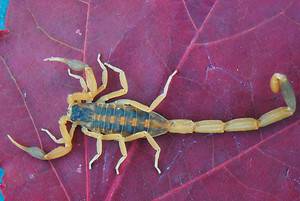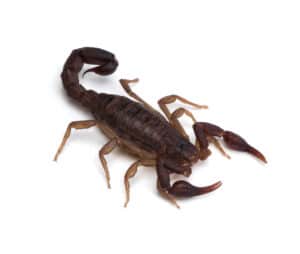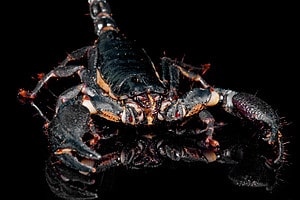With their eight legs and defensive, hooked stinger, scorpions are the type of animal that leaves an impression. But while it can be easy to lump them all into one category, there are over 2,500 species of scorpions that have been identified. From Africa’s large and luminescent Emperor scorpion to North America’s ubiquitous bark scorpion, these creatures occupy a wide variety of habitats and express diversity in their diets, hunting methods, and predators. But there are some notable similarities that recur across the different scorpion species.
Scorpions can be found on every continent except Antarctica. While most species prefer plains and deserts, others have learned to adapt to colder and more mountainous regions. Their adaptability is a reflection of their generalist eating habits and the wide adaptability of their hunting techniques. Every species of scorpion is a strict carnivore, and they aren’t particularly picky ones. Any animal that’s small enough to be immobilized can be potential prey for a scorpion.
While their regional diversification means that scorpion prey species are too abundant to list in full, most scorpions seek out similar foods. As an example, the bark scorpion can be found throughout the American desert and is North America‘s most common scorpion species. The bulk of their diet comprises invertebrates — and centipedes, spiders, and katydids rank high on their list of available foods. As is commonly the case with scorpion species, bark scorpions sometimes cannibalize other bark scorpions or members of other scorpion species. This is usually an attempt at population control.
Larger species like the emperor scorpion sometimes target significantly larger prey. Measuring up to nine inches in length, they’re known to prey on lizards and even small mammals like mice. Regardless of their size, methodology, or habitat, most scorpions have a diverse menu to choose from. Desert sand scorpions can be found in the American southwest, and researchers have uncovered nearly a hundred different prey species in their environment. Nearly half of their appetite is comprised of beetles, while other scorpions constitute 16% of their diet. Scorpions often even feast on traditionally dangerous insects like wasps.
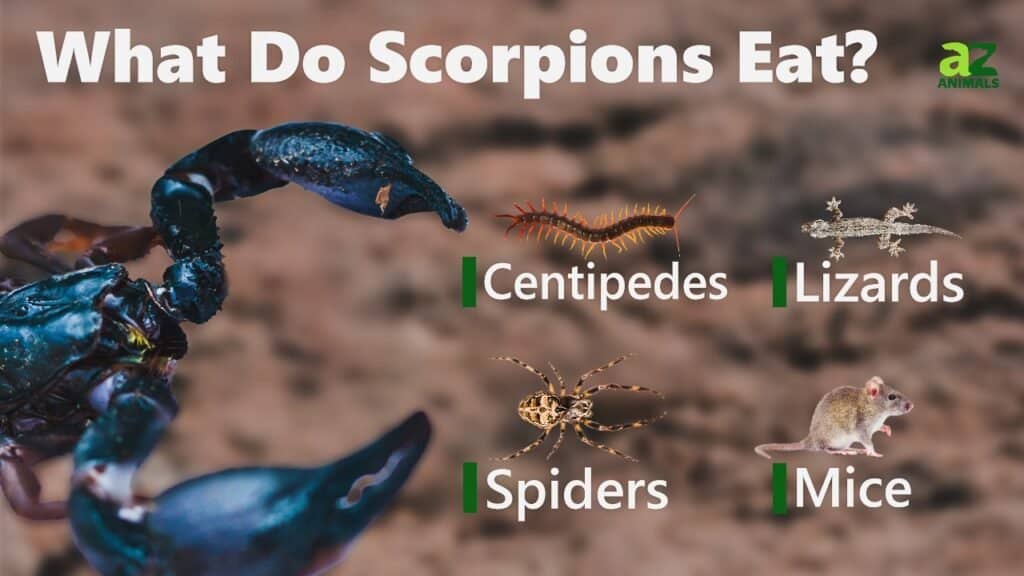
What Do Pet Scorpions Eat vs Scorpions in the Wild?
Emperor scorpions rank among the most popular choice for pets. While they may hunt reptiles and even mammals in the wild, their feeding habits in captivity tend to be more narrow due to practical demands. Spiders, crickets, and grasshoppers are popular feeding choices, but moths and centipedes are frequently fed to pet scorpions too.
Depending on their size and environment, scorpions may eat a diet that includes:
- Insects (grasshoppers, termites, beetles, flies, wasps)
- Arachnids (spiders, other centipedes)
- Other Invertebrates (worms, mollusks)
- Squamates (snakes, lizards)
- Rodents (mice)
How Do Scorpions Hunt For Food?
Scorpions have managed to spread throughout the entire world primarily because they’re opportunistic predators. They’ll eat any meat that they can find, and their hunting and defensive methods can adapt to practically any environment on Earth. The fact that there are a staggering 10 quintillion insects on the planet at any given time means that scorpions are rarely lacking for prey. But the survival of these arachnids is further bolstered by their ability to be selective. Many species of scorpion can survive for a full year without a meal, but they’re more likely to average a meal every two to three weeks. They’re more likely to die from a lack of water. Scorpions can survive practically anywhere, but most are territorial creatures that will remain in the same burrow for their entire lives. The primary exception is when males venture from their territory to mate.
Most scorpions are ambush predators, but they’re capable of adapting their behaviors to match their habitats. Some will simply wait in their burrows and lash out when prey walks by. Others actively forage in pursuit of prey. Foraging habits seem to vary depending on not just the availability of prey but also the number of predators. There’s some evidence that greater numbers of predators lead to higher rates of cannibalism among scorpions. Some scorpions have even been seen employing a tactic similar to antlions — setting up traps in the sand for prey to fall into.
Scorpions are nocturnal predators that are practically blind. Their eyes can be used to detect movement, but they mainly rely on fine hairs and sensory structures known as pectines to detect prey and predator and navigate their environments. Once they find food, they use a combination of their powerful claws and venomous stinger to immobilize prey. Since producing venom can be an intensive process, adults will typically rely on their claws to rip apart smaller prey and reserve their venom for predators and larger prey. Like spiders, scorpions have to dissolve their food to eat it.
Baby scorpions spend their first few days of existence growing on their mother’s back. Mother scorpions tend to be fiercely protective of their babies, which spend this time getting nourishment from the yolk sac surrounding them. Once they finish their first molt, a baby scorpion will adopt the same diets as an adult. Some mothers may bring a fresh kill to their freshly molted babies, but a hungry mother may also feed on baby scorpions if there’s no readily available prey.
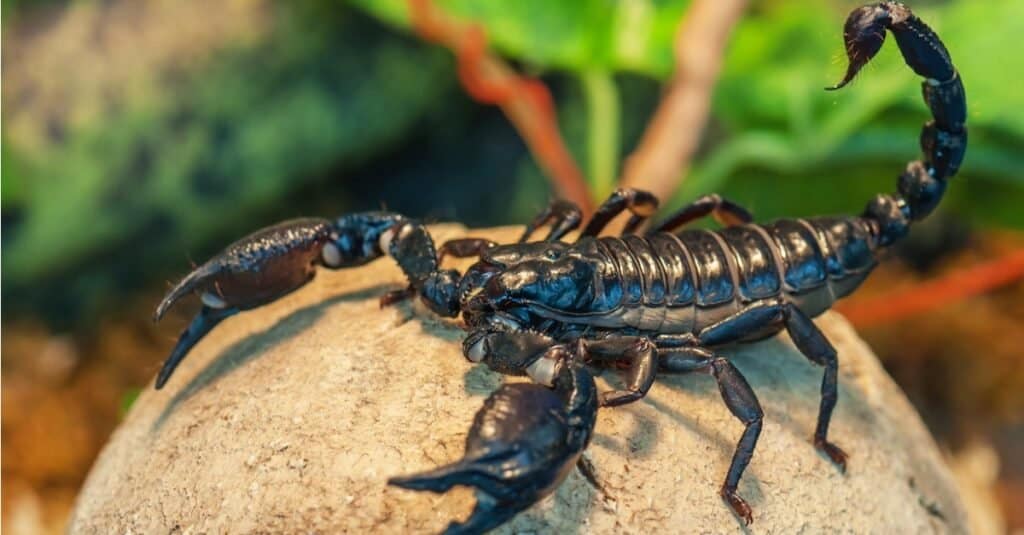
©Vova Shevchuk/Shutterstock.com
What Animals Eat Scorpions?
Scorpions may be opportunistic predators, but they’re prey to any number of larger and opportunistic species as well. The massive pincers and venom stinger of a scorpion are often not enough to scare off larger animals — and scorpions in most ecosystems will find themselves victim to a variety of birds, mammals, and fellow arthropods.
In some instances, predators have even developed an evolutionary immunity to scorpion venom. Bats and mongoose are either immune or highly resistant to the toxins a scorpion produces. The southern grasshopper has developed a particularly innovative defense. While it’s not immune to venom, the southern grasshopper mouse produces a protein that blocks the pain receptor from reaching its brain. Other predators like the meerkat and shrew have developed specific hunting techniques that allow them to disable scorpions without being stung. Some larger birds like owls and hornbills are simply too large and powerful to scorpions to even pose a threat. A few scorpion predators are even venomous in their own right — with South America‘s Amazonian giant centipede and tarantulas standing out as two of the most prominent venomous predators.
Up Next…
Keep reading these posts for more incredible information about key animal facts.
- What Do Beetles Eat? They eat other insects, cotton, and moldy fruit. Find out just how varied their diets are.
- What Do Centipedes Eat? They are carnivorous and might just be lurking somewhere damp and shady near you. Find out how their clandestine presence can be beneficial and discomfiting at once.
- What Do Ants Eat? Some of them raise their own food, others dabble in a bit of horticulture, and others set upon any food source in their numbers. Read about how they do all that and more in this post.
The photo featured at the top of this post is © iStock.com/yod67
Thank you for reading! Have some feedback for us? Contact the AZ Animals editorial team.



